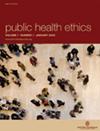Law, Virtue, and Public Health Powers
IF 2
3区 哲学
Q2 ETHICS
引用次数: 1
Abstract
This article contributes to philosophical reflections on public health law by drawing on virtue jurisprudence, which rests on the straightforward observation that a political community and its laws will inevitably shape the character of its officials and subjects, and that an excellent character is indispensable to fulfilment. Thus, the law is properly set to encourage virtue and discourage vice. This opens a new perspective onto the ultimate purpose of public health law that is human flourishing. The means of pursuing this end is to entrust public health powers to officials to virtuously serve the common good, of which population health is one of its most important constituents, within the bounds of the law of the land. This article calls for the adoption of a Prudent Public Health Official standard into the law, in order to cultivate prudent, just, courageous and temperate characters in officialdom. Interestingly, this standard already chimes with certain pre-existing core principles of public health judicial doctrine in the USA, the European Union and the UK.法律、美德与公共卫生权力
本文通过借鉴德性法学对公共卫生法进行哲学思考,德性法学基于这样一种直观的观察,即一个政治共同体及其法律将不可避免地塑造其官员和臣民的性格,而优秀的性格是实现目标所不可或缺的。因此,法律是用来鼓励美德,阻止邪恶的。这为公共卫生法的最终目的——人类繁荣——打开了一个新的视角。实现这一目标的手段是将公共卫生权力委托给官员,让他们在国家法律的范围内为共同利益服务,其中人口健康是其最重要的组成部分之一。本文呼吁将“慎卫官”标准纳入法律,以培养官场审慎、公正、勇敢、节制的品格。有趣的是,这一标准已经与美国、欧盟和英国公共卫生司法学说的某些预先存在的核心原则相吻合。
本文章由计算机程序翻译,如有差异,请以英文原文为准。
求助全文
约1分钟内获得全文
求助全文
来源期刊

Public Health Ethics
PUBLIC, ENVIRONMENTAL & OCCUPATIONAL HEALTH-MEDICAL ETHICS
CiteScore
3.10
自引率
9.50%
发文量
28
审稿时长
>12 weeks
期刊介绍:
Public Health Ethics invites submission of papers on any topic that is relevant for ethical reflection about public health practice and theory. Our aim is to publish readable papers of high scientific quality which will stimulate debate and discussion about ethical issues relating to all aspects of public health. Our main criteria for grading manuscripts include originality and potential impact, quality of philosophical analysis, and relevance to debates in public health ethics and practice. Manuscripts are accepted for publication on the understanding that they have been submitted solely to Public Health Ethics and that they have not been previously published either in whole or in part. Authors may not submit papers that are under consideration for publication elsewhere, and, if an author decides to offer a submitted paper to another journal, the paper must be withdrawn from Public Health Ethics before the new submission is made.
The editorial office will make every effort to deal with submissions to the journal as quickly as possible. All papers will be acknowledged on receipt by email and will receive preliminary editorial review within 2 weeks. Papers of high interest will be sent out for external review. Authors will normally be notified of acceptance, rejection, or need for revision within 8 weeks of submission. Contributors will be provided with electronic access to their proof via email; corrections should be returned within 48 hours.
 求助内容:
求助内容: 应助结果提醒方式:
应助结果提醒方式:


